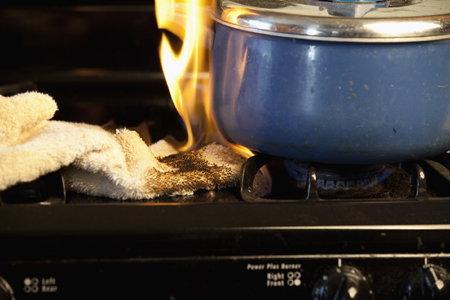The following is a guest post from our friends at Allstate Insurance. You can never be too careful when cooking in your kitchen. Check out Allstate’s blog for the latest in insurance and life’s safety tips. Here are their tips to stay safe when making meals at home.
Cooking is an activity that brings together family and friends in the kitchen, the hub of the house. But if cooks aren’t careful, they may quickly discover the downside of a hot flame or oven. Cooking is the leading cause of home fires (one out of every three), according to the National Fire Protection Association. A long, billowy sleeve too close to a gas stove could singe, a hot frying pan with bubbling oil may ignite, or grease spilled in a hot oven could turn to flames when a cook steps away briefly to answer a door. But, safe cooking isn’t a tough recipe to follow. It just requires focus. Here are 10 key precautions to help prevent a kitchen fire:
1. Never cook if you’re tired. The same goes if you’ve consumed alcohol or if you’re on certain types of medication. There’s a chance you might be too distracted to pay close attention.
2. Stay in the kitchen when you fry, grill or broil food. You should always keep an eye on what you’re cooking.
3. Use a timer to remind you when it’s time to remove your creation from the heat. It’s easy to get distracted when something’s in the oven, especially when there’s lots of activity going on.
4. If you need to step away, take a potholder to remind you that food is still cooking, suggests Underwriters Laboratories (UL).
5. Keep flammable objects away from flames and other heat sources. Likely culprits may include clothing, dish towels, grocery-shopping lists, plastic bags and appliance cords.
6. Establish a child-free zone. Set the kid-free zone at least 3 feet from burners. If your child is the next Emeril Lagasse or Julia Child, make sure to teach him or her safety, too.
7. Have a working smoke detector nearby. Check batteries monthly and replace them at least twice yearly, or more often, if they require it. And, you may want to consider a fire extinguisher as part of a multi-pronged approach to fire safety.
8. Keep burners and ovens clean. This can decrease the risk of grease fires.
9. Never use an oven for heat. Using a gas oven for heat creates a risk of carbon monoxide poisoning. If your finances are tight, consider talking to your local heat supplier for ways to manage your bill.
10. Never use a microwave or oven for storage. Someone may forget that there are items stored in the microwave or oven, turn it on and inadvertently start a fire.
And, if a kitchen fire should start, here are three tips to remember:
• When in doubt, don’t attempt to put out the fire. That’s per the NFPA, which suggests exiting the house, closing the door behind you, and calling 911. Follow your family’s escape plan, so everyone gets out, including your pets.
• Have a lid or cookie sheet near pots and pans when cooking. If a grease fire starts, smother flames by sliding one over the pan, says the NFPA, and turn off the burner. If it’s an oil fire, don’t throw water on the flames, which could spread them.
• Turn off the oven if a fire starts, and shut the oven door to stop oxygen from feeding it. If you suspect the oven is malfunctioning, have it checked before its next use.
Remember, one way to help prevent kitchen fires is to avoid multitasking while you’re cooking. Even if you think you can simultaneously boil pasta and catch Downton Abbey’s latest episode, don’t. Lady Mary and Matthew will wait.
This guest post comes from the editors of The Allstate Blog, which helps people prepare for the unpredictability of life.


No Comments